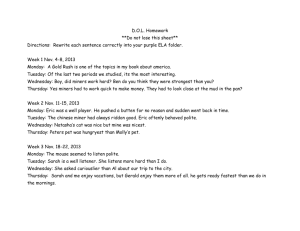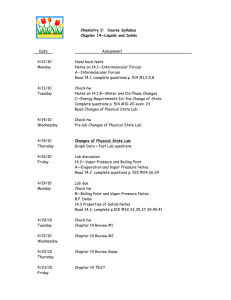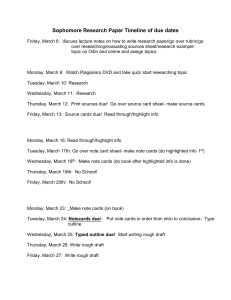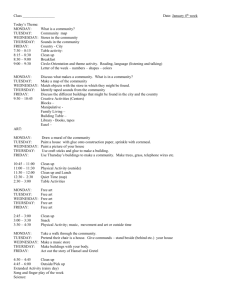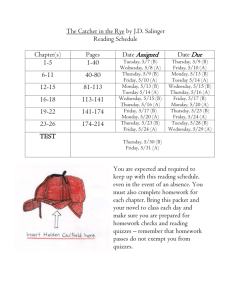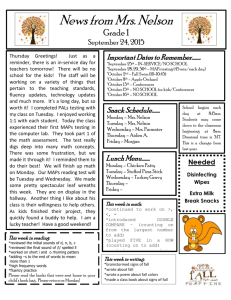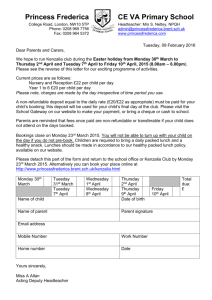math, english, us history, earth science, biology
advertisement
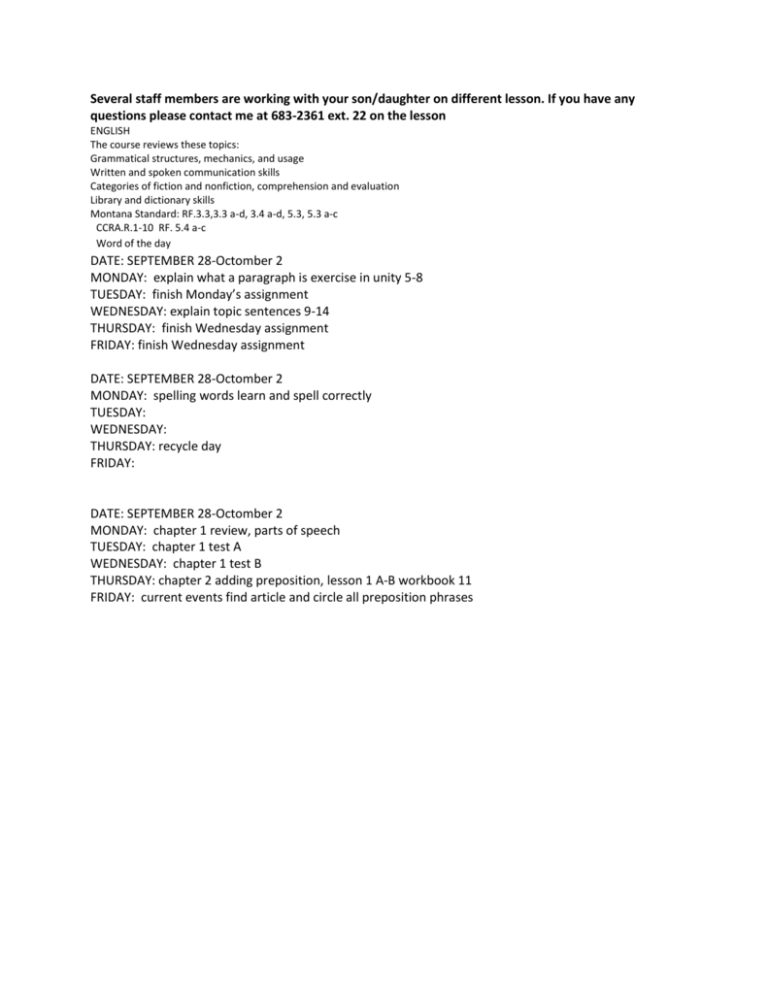
Several staff members are working with your son/daughter on different lesson. If you have any questions please contact me at 683-2361 ext. 22 on the lesson ENGLISH The course reviews these topics: Grammatical structures, mechanics, and usage Written and spoken communication skills Categories of fiction and nonfiction, comprehension and evaluation Library and dictionary skills Montana Standard: RF.3.3,3.3 a-d, 3.4 a-d, 5.3, 5.3 a-c CCRA.R.1-10 RF. 5.4 a-c Word of the day DATE: SEPTEMBER 28-Octomber 2 MONDAY: explain what a paragraph is exercise in unity 5-8 TUESDAY: finish Monday’s assignment WEDNESDAY: explain topic sentences 9-14 THURSDAY: finish Wednesday assignment FRIDAY: finish Wednesday assignment DATE: SEPTEMBER 28-Octomber 2 MONDAY: spelling words learn and spell correctly TUESDAY: WEDNESDAY: THURSDAY: recycle day FRIDAY: DATE: SEPTEMBER 28-Octomber 2 MONDAY: chapter 1 review, parts of speech TUESDAY: chapter 1 test A WEDNESDAY: chapter 1 test B THURSDAY: chapter 2 adding preposition, lesson 1 A-B workbook 11 FRIDAY: current events find article and circle all preposition phrases EARTH SCIENCE By studying Earth, its composition, history and the processes that shape it, students gain a better understanding of the planet on which they live. Changes in lithosphere, atmosphere, and hydrosphere have profound effects on human existence. Knowledge of the Solar System and the universe helps students make predictions about Earth and informed decisions about the future. Montana Standard: (ARM 10.54.5087-5090) DATE: SEPTEMBER 28-Octomber 2 MONDAY: chapter 2 vocabulary words, define TUESDAY: chapter 2 lesson 1 questions workbook 4 WEDNESDAY: chapter 2 lesson 2 questions workbook 5 THURSDAY: chapter 2 lesson 3 workbook 6 FRIDAY: current events find article which is written for science MATH Students should develop an understanding: *understand numbers, meanings of operations and compute fluently. *understand patterns, relations and functions. Represent and analyze mathematical situations *understand how to analyze characteristics and properties of geometry. Understand geometric shapes. *understand attributes of objects and the units, systems and processes of measurements. *formulate data and collect, organize, and display answers. *build new mathematical knowledge through problem solving *recognize reasoning and proof as fundamental aspects of math * organize and consolidate mathematical thinking through communication Montana Standard: 6.NS, 6.EE, 7.NS, 7.EE Algebra DATE: SEPTEMBER 28-Octomber 2 MONDAY: page 51, 1-10 data, assignment 6-10 and 11-13 TUESDAY: begin review for tests pg. 58-59 WEDNESDAY: continue test review THURSDAY: chapter 1 test FRIDAY: go over test and enrichment activity Basic Math DATE: SEPTEMBER 28-Octomber 2 MONDAY: clock book 1 1 pg. 30-36, timed math 6 TUESDAY: add book 1 pg.17-18 WEDNESDAY: clock book 1 1 pg. 37-40, timed math 7 THURSDAY: add book 1 pg.19 timed 8 FRIDAY: clock book 1 1 pg. 41-44 math game, BIOLOGY Students should develop: Abilities necessary to do scientific inquiry Understandings about scientific inquiry Cells and structure and function in living system Reproduction and heredity Molecular basis of heredity Biological evolution Interdependence of organisms Matter, energy, and organization Diversity and adaptations of organisms Behavior of organisms Personal and community health Population growth Natural resources Environmental quality Natural and human-induces hazards DATE: SEPTEMBER 28-Octomber 2 MONDAY: read 36-40, chapter 9 TUESDAY: read 41-45, practice 10 pages 45, correct and discuss WEDNESDAY: correct homework, read 45-49, practice 11 THURSDAY: read 49-53 practice 12 FRIDAY: review lesson 3-4 DATE: SEPTEMBER 28-Octomber 2 MONDAY: matching game, vocabulary game TUESDAY: Complete review pages 42 go over and correct WEDNESDAY: study for test THURSDAY: chapter 2 test, correct FRIDAY: chapter review US History Montana standards for History: 1. Cite specific textual evidence to support analysis of primary and secondary sources, attending to such features as the date and origin of the information. 1. Cite specific textual evidence to support analysis of primary and secondary sources, connecting insights gained from specific details to an Understanding of the text as a whole. 2. Determine the central ideas or information of a primary or secondary source; provide an accurate summary of the Source distinct from prior knowledge or opinions. 4. Determine the meaning of words and phrases as they are used in a text, including vocabulary specific to domains Related to history/social studies. 5. Describe how a text presents information (e.g., sequentially, Comparatively, causally). 6. Identify aspects of a text, including those by and about American Indians, that reveal an author’s point of view or purpose (e.g., loaded language, inclusion or avoidance of particular facts). 7. Integrate visual information (e.g., in charts, graphs, photographs, videos, or maps) with other information in 8. Distinguish among fact, opinion, and reasoned judgment in a text including texts by and about American Indians. 9. Analyze the relationship between a primary and secondary source on the same topic, including sources by and about American Indians. DATE: SEPTEMBER 28-Octomber 2 MONDAY: Test A chapter 1-4 use book TUESDAY: Test B no book WEDNESDAY: chapter 7 THURSDAY: chapter 8 FRIDAY: work sheets a-c Vocational Work Study Career management is a semester-length high school elective course that assists students in their preparation for career selection. The course is designed to improve workforce skills needed in all careers including: 1. Communication 2. Leadership 3. Teamwork 4. Decision making 5. Problem solving 6. Goal setting 7. Time management Students will complete activities that help identify personal interests, aptitudes, and learning styles. Students will use results of self-assessments to determining careers that may prove personally satisfying. In addition to the default course program, Career Management includes alternate lessons, projects, and tests for use in enhancing instruction or addressing individual needs. Montana standards for workplace competencies: content standard 1-6 Students will be creating cover letter and job application to start a portfolio. Student will use computers in library which will enhance their typing skills. Criminal Justice: Students will understand how the court system works: reading and writing text.

